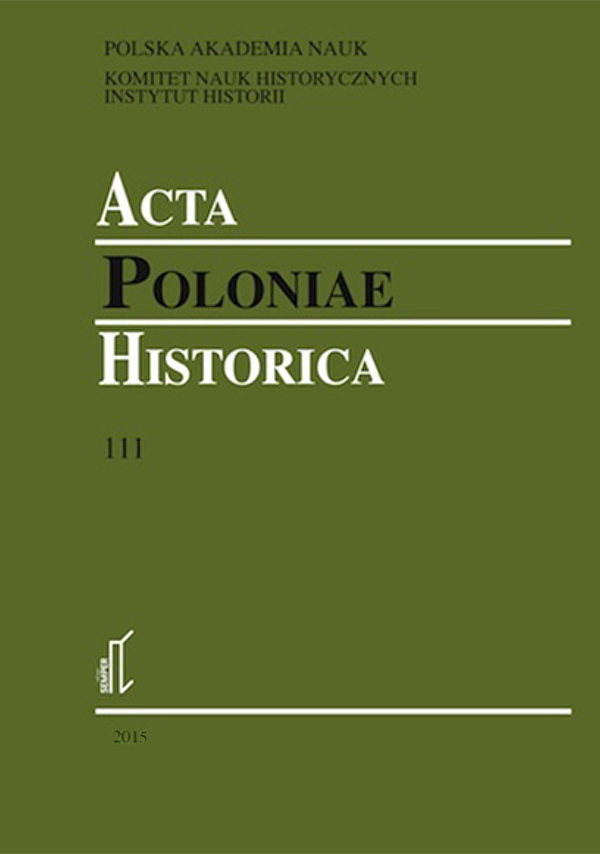Bitterly Triumphant: The Biologisation of National Character in the Twentieth-Century East Central Europe
DOI:
https://doi.org/10.12775/APH.2015.111.02Keywords
racial anthropology, First World War, East Central Europe, Germany, national character, modernizationAbstract
In early twentieth century racial ideologies and racial anthropology penetrated the traditional concepts of national specificity. It was a rule all over Western Europe, though Germany was clearly the leader both in ideological and institutional terms. In East Central Europe this development was accelerated by an increased intellectual influence of German universities. First World War marked the peak of these processes. Racial anthropology was expected to deliver a scientific interpretation of the continental conflict. In East Central Europe it was equally an argument in support of ethnic and territorial claims. The article discusses eight examples of regional theories based on discursive connections between race and nation: Hungary, Ukraine, Serbia, Poland, Finland, Romania, Lithuania, and Bohemia. Their authors were experts: professional anthropologists, geographers, ethnologists and medical scientists. Generally it can be argued that all of these theories were successful. A considerable part of them (notably the Serb, Polish, Finnish) contributed to the construction of ‘national unity’ of the newly formed states. Others, despite their failure to do so, were instrumental in the formation of national movements and strengthened the idea of national peculiarity. Almost all of them succeeded in entering the mainstream of the European racial sciences in the interwar period. Consequently, their authors made considerable careers in the academia. But in long run the post-1945 evolution of physical anthropology marginalized racial theories. After the collapse of the Third Reich what had been the mainstream of physical anthropology gradually turned into a scientific and ideological Sonderweg. The experts dealt with in this article caught up to the art of modernity that unexpectedly run out of fashion.References
Batowski Henryk, Rozpad Austro-Węgier 1914–1918 (sprawy narodowościowe i dzia¬łania dyplomatyczne) (Cracow, 1982).
Bošković Aleksandar, ‘Distinguishing “Self ” and “Other”: Anthropology and National Identity in Former Yugoslavia’, Anthropology Today, xxi, 2 (2005), 8–13.
Brzeziński Tadeusz, Polskie peregrynacje po dyplomy lekarskie (od średniowiecza po odzyskanie niepodległości w 1918 r.) (Warsaw, 1999).
Bunzl Matti and Penny H. Glenn (eds.), Worldly Provincialism: German Anthropology in the Age of Empire (Ann Arbor, 2003).
Czekanowski Jan, Beiträge zur Anthropologie von Polen (Braunschweig, 1911).
Czekanowski Jan, Zarys antropologii Polski (Lvov, 1930).
Czekanowski Jan, Anthropologische Beiträge zum Problem der slawisch-finnischen Beziehungen (Helsinki, 1925).
Czekanowski Jan, Wstęp do historii Słowian. Perspektywy antropologiczne, etnograficzne, prehistoryczne i językoznawcze (Lvov, 1927).
Dvorniković Vladimir, Karakterologija Jugoslovena (Belgrade, 20002).
Evans Andrew D., Anthropology at War: World War I and the Science of Race in Germany (Chicago and London, 2010).
Felder Björn M. and Weindling Paul J. (eds.), Baltic Eugenics: Bio-Politics, Race and Nation in Interwar Estonia, Latvia and Lithuania 1918-1940 (Amsterdam and New York, 2013).
Gawin Magdalena, Rasa i nowoczesność. Historia polskiego ruchu eugenicznego (Warsaw, 2003).
Górny Maciej, ‘Die polnisch-ukrainische Rivalität in Ostgalizien. Anthropologie, Geo¬grafie, Geschichtswissenschaft’, in Der Erste Weltkrieg und der Vielvölkerstaat (Sym¬posium im Heeresgeschichtlichen Museum) (Acta Austro-Polonica, 2, Vienna, 2012).
Günther Hans F.K., Rasse und Stil. Gedanken über ihre Beziehungen im Leben und in der Geistesgeschichte der europäischen Völker, insbesondere des deutschen Volkes (Munich, 1926).
Hesch Michael, Letten, Litauer, Weißrussen. Ein Beitrag zur Anthropologie des Ost¬baltikums mit Berücksichtigung der Siedlungs-und stammesgeschichtlichen Grund¬lagen (Vienna, 1933).
Hesch Michael and Spannaus Günther (eds.), Kultur und Rasse. Otto Reche zum 60. Geburtstag gewidmet von Schülern und Freunden (Munich, 1939).
Янiв Boлoдимиp, Hapиcи дo icтopiї yкpaїнcькoї eтнoпcиxoлoгiї (Munich, 1993).
Jekelfalussy József von (ed.), Der tausendjährige ungarische Staat und sein Volk (Budapest, 1896).
Johler Reinhard, Christian Marchetti and Monique Scheer (eds.), Doing Anthropol¬ogy in Wartime and War Zones. World War I and the Cultural Sciences in Europe (Bielefeld, 2010).
Kemiläinen Aira, Finns in the Shadow of the “Aryans”: Race Theories and Racism (Helsinki, 1998).
Lutzhöft Hans-Jürgen, Der nordische Gedanke in Deutschland 1920–1940 (Stuttgart, 1971).
Matiegka Jindřich J., Vznik a tělesný stav národa československého (Prague, 1920).
Molik Witold, Polskie peregrynacje uniwersyteckie do Niemiec 1871–1914 (Poznan, 1989).
Ossowski Stanisław, Więź społeczna i dziedzictwo krwi (Warsaw, 1966).
Promitzer Christian, Sevasti Trubeta, and Marius Turda (eds.), Health, Hygiene and Eugenics in Southeastern Europe to 1945 (Budapest and New York, 2011).
Pyдницький Cтeпaн, Чoмy ми xoчeмo caмocтiйнoї Укpaїни (Lvov, 1994).
Stebelsky Ihor, ‘Putting Ukraine on the Map: The Contribution of Stepan Rudnyts’kyi to Ukrainian Nation-Building’, Nationalities Papers, xxxix, 4 (2011), 587–613.
Suominen Yrjö K., ‘Physical Anthropology in Suomi (Finland)’, The Journal of the Royal Anthropological Institute of Great Britain and Ireland, 59 (1929), 207–30.
Surman Jan, Habsburg Universities 1848–1918. Biography of a Space (Vienna, 2012) (a PhD thesis submitted at the University of Vienna).
Surman Jan and Mozetič Gerald (eds.), Dwa życia Ludwika Gumplowicza. Wybór tekstów (Warsaw, 2010).
Trampe Ludwig, Ostdeutscher Rassenkampf (Leipzig, 1907).
Trencsényi Balázs, The Politics of ‘National Character’. A Study in Interwar East European Thought (London and New York, 2012).
Turda Marius, ‘In Search of Racial Types: Soldiers and the Anthropological Mapping of the Romanian Nation, 1914–44’, Patterns of Prejudice, xlvii, 1 (2013), 1–21.
Turda Marius, ‘Race, Politics and Nationalist Darwinism in Hungary, 1880–1918’, Ab Imperio 1, (2007), 139-64.
Turda Marius, The Idea of National Superiority in Central Europe, 1880–1918 (Lam¬peter, 2004).
Turda Marius and Weindling Paul J. (eds.), “Blood and Homeland”: Eugenics and Racial Nationalism in Central and Southeast Europe, 1900–1940 (Budapest and New York, 2007).
Weigner Karel (ed.), Die Gleichwertigkeit der europäischen Rassen und die Wege zu ihrer Vervollkommung (Prague, 1935).
Boвк Xвeдip, Cтyдiї з yкaїнcкoї eтнoгpaфiї тa aнтpoпoлoгiї (Prague, 1916).
Županić Niko, Altserbien und die albanesische Frage (Vienna, 1912).
Downloads
Published
How to Cite
Issue
Section
License
Title, logo and layout of journal are reserved trademarks of APH.Stats
Number of views and downloads: 602
Number of citations: 1



